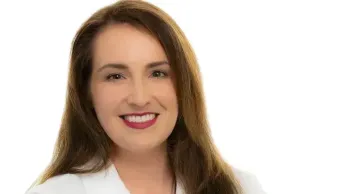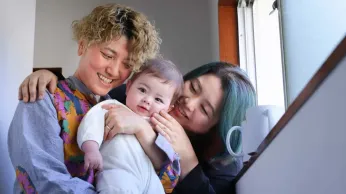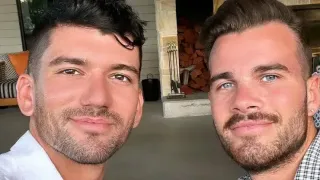
Aug 25
Focus on Providers: Dr. Jessica Bauer of South Florida’s IVFMD
Kilian Melloy READ TIME: 1 MIN. SPONSORED
The dream of parenthood is powerful — and Dr. Jessica Bauer of IVFMD In South Florida is devoted to turning that dream into a joyful reality.
"At the end of the day, there are certain things patients just have to do, and most people are happy to do those things." The deep desire to welcome children into a loving home, Dr. Bauer notes, is "a powerful motivator."
Equally powerful is the combination of expertise and acceptance that providers at IVFMD bring to the family-building experience. At the clinics in The Prelude Network — North America's largest and fastest-growing network of fertility clinics — beautiful results come about through top-notch scientific expertise, skillful guidance, and detailed attention to each family's unique needs. The Network’s providers help every committed couple or solo prospective parent chart their own path to realizing their family-building dreams, and the possibilities are abundant.
IVFMD operates six locations throughout South Florida: Miami, Hollywood, Boca, Jupiter, Naples, and Viera. "I see patients at our Jupiter and Boca Raton offices," Dr. Bauer says.
Dr. Bauer decided to become a fertility specialist during her training as an OBGYN. "The first time I saw a baby being born, I was like, 'That's probably the coolest thing I've ever seen,' and I wanted to be involved in that," she shares. "I decided to specialize, and what really fit the bill for me was reproductive endocrinology and infertility, or REI."

Source: Getty
While helping patients fulfill their dreams of parenthood is exciting, so are the constant developments in fertility care. Dr. Bauer explains. "What we're doing now is not what I was doing when I was an OB-GYN resident or even in fellowship. Things have changed so dramatically, and I love that we're able to continuously improve technology for better patient outcomes."
The technology may be complex, but the basic recipe for every new life is simple. Gametes — the genetic contributions from two biological parents — must come together to complete the DNA blueprint of a unique individual. For this to happen, sperm must unite with an egg (ovum), which then becomes an embryo. The embryo needs a uterus where it can develop during the nine-month gestation period. If any of these three elements are missing, conception and gestation cannot occur.
That's where reproductive medicine comes in. IUI (intra-uterine insemination) involves placing the sperm directly into the uterus to increase the chance of fertilization. IUIs can be done without medication during a patient’s natural menstrual cycle or with injectable hormones. These medications encourage a patient to produce more than one egg, which may increase the chances of success; however, it also increases the risk of having twins and triplets.
With IVF (in vitro fertilization), the uniting of human gametes is more technical and precise. Sperm and eggs are united under laboratory conditions, creating embryos that can be implanted one at a time into the uterus of a prospective parent or gestational carrier. Embryos not transferred immediately can be preserved at sub-zero temperatures, remaining viable for years or even decades and allowing the same prospective parents to grow their families with additional children when they choose.
For LGBTQ+ families, fertility care is an increasingly common avenue to parenthood, and many queer families need help sourcing one or more of the three essential ingredients. A solo prospective parent with sperm but no eggs, for instance, will need an egg donor and a gestational surrogate. One uniquely intimate option called reciprocal IVF allows for two individuals with ovaries and a uterus to play a biological role in creating and growing a child. One partner’s egg is fertilized by donor sperm, and the resulting embryo is transferred to the other partner’s uterus. This beautiful experience allows one partner to carry the baby while the other is genetically related to the baby.

Source: Getty
Often, it's the specialists making up what’s known as the third-party team that help match prospective parents with gestational carriers, sperm donors, and egg donors.
"At IVFMD we have an entire third-party department," Dr. Bauer notes. "There are specific rules that apply, and the FDA mandates how we handle those situations. We have a dedicated department of wonderful nurses who know those rules and walk our patients through the process."
IVFMD has their own, thriving, egg donor program and works with several verified sperm and egg banks to help patients achieve their family-building goals. Whatever the circumstance, the team at IVFMD applies the same meticulous care to all patients throughout their entire treatment cycle.
"A lot of what goes into matching egg donors and sperm donors comes down to, 'What does the patient prefer?'" Dr. Bauer explains. "If one partner can't use their gametes, they usually want the donor to resemble them in terms of ethnicity or education level, or other characteristics that are important to them. We also need to ensure that eggs and sperm are compatible from a genetic perspective."
An obvious solution for genetic compatibility might be turning to a close relative for sperm or ova donation — but, Dr. Bauer cautions, things might not be that simple.
"Using a known or directed donor can be done," just as anonymous donations from sperm or egg banks can, "and again, they need to go through a rigorous process to confirm they are, in fact, a good candidate. Just because it's your sister doesn't mean they're a good candidate to donate eggs if they're 45, right?" Dr. Bauer points out. "We always have to balance a shared genetic component against the question, 'What is the chance of success using this egg donor or sperm donor?'"

Source: Getty
No matter what element might come from a third party — or who that third party might be — the IVFMD team examines the donor's medical history to ensure a successful match.
"Have eggs from this donor produced a baby before? Has sperm from this donor produced a baby before? These are good questions," Dr. Bauer specifies. "Do they check all your boxes from a genetic perspective?"
For gestational carriers, "What is their history of delivering babies before?" Dr. Bauer asks. "Have they ever had complications in pregnancy? Did they deliver full-term? Was there anything concerning about the pregnancy or delivery?
"We make sure, from a medical perspective, that they are a good option to provide the best chance of success for the couple," Dr. Bauer adds. "And then there's legal aspects that need to happen. Attorneys handle gestational carrier contracts. Also, both the couple and the gestational carrier, as well as the gestational carrier's partner if they have one, need to go through psychological consultation to make sure everyone involved understands what they are getting into, because everyone can appreciate that there's more to this than just the medical side.
"There are lots of steps," Dr. Bauer summarizes. "It's not an insurmountable checklist, but it can be daunting. The good news is, we have a dedicated team that's extraordinarily familiar with the process, so you don't have to be."

Source: Getty
A crucial component of IVF and other forms of fertility care that queer families seek is the respect and inclusion that's essential to all clinics belonging to The Prelude Network.
"What we do here is all-inclusive," Dr. Bauer says. "I don't see a same-sex couple any differently than a heterosexual couple. We just do what is right for the patient and help them achieve their goals." To that end, she adds, "We have an electronic health record that is very flexible with not only gender, but with how we partner patients together, and that makes it a very inclusive and easy way for us to keep track of everything.
"We take pride in making sure that all our staff is appropriately trained regarding addressing people appropriately and being well-versed in reviewing the chart prior to speaking with patients so that they're aware of each patient's particular situation."
Dr. Bauer has a personal connection to her specialty. "I guess it's a little bit selfish," she says of her work in fertility care. "Both my brother and I were conceived using Clomid, which is probably the oldest fertility medication that exists." [Science history note: The drug clomifene, of which Clomid is a brand, was approved by the FDA in 1967.]
"It's an ovulation induction agent," Dr. Bauer clarifies. "My mother struggled with polycystic ovarian syndrome. I'm actually a product of fertility treatment, and here I am! I love that aspect of it."
Kilian Melloy serves as EDGE Media Network's Associate Arts Editor and Staff Contributor. His professional memberships include the National Lesbian & Gay Journalists Association, the Boston Online Film Critics Association, The Gay and Lesbian Entertainment Critics Association, and the Boston Theater Critics Association's Elliot Norton Awards Committee.






